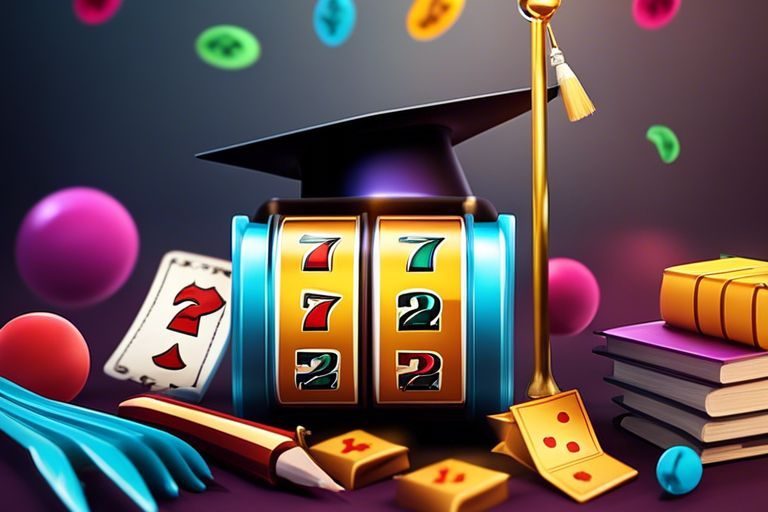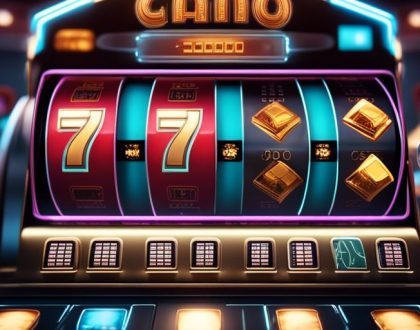Learning from Losses – Value of Slots

Education in the world of gambling goes beyond just the wins; it involves understanding the losses as well. With respect to the world of slots, where luck plays a significant role, learning from losses is a crucial aspect that can provide valuable insights and lessons. In this blog post, we will explore the educational value of slots losses and how they can help players improve their strategies and decision-making skills.
The Psychology Behind Slot Engagement
The Role of Dopamine in Gambling
A well-known neurotransmitter, dopamine plays a crucial role in many aspects of human behavior, including motivation, movement, and reward-seeking. In relation to gambling, dopamine is released in the brain when a person engages in activities that are associated with pleasure or reward. This release of dopamine can create a sense of euphoria and excitement, which can be highly reinforcing, making individuals more likely to continue engaging in the behavior, such as playing a slot machine.
The Near-Miss Effect and Player Persistence
It is a well-documented phenomenon that near-misses in gambling can lead to increased arousal and motivation to continue playing. When a player experiences a near-miss, where the outcome is very close to a win but falls just short, it triggers a similar response in the brain as a actual win. This can lead to increased excitement and the belief that a win is just around the corner, keeping players engaged and persistent in their gameplay.
The near-miss effect can be particularly powerful as it tricks the brain into thinking that the player was close to winning, increasing the desire to keep playing in hopes of achieving that elusive jackpot. This effect can be dangerous as it can lead players to chase losses and engage in risky gambling behaviors in the hopes of experiencing that winning sensation.
Financial Literacy Through Slots
Clearly, slot machines are often associated with negative connotations related to financial loss and addiction. However, when approached with the right mindset, playing slots can actually improve financial literacy and responsible gambling habits.
Understanding Randomness and Odds
One necessary lesson that can be learned from playing slots is the concept of randomness and odds. Slot machines operate based on Random Number Generators (RNG), meaning that every spin is independent and has the same probability of winning or losing. This understanding can help individuals grasp the idea that each outcome is unpredictable and not influenced by past results.
Budgeting and Managing Bankrolls
An important aspect of financial literacy that can be developed through playing slots is budgeting and managing bankrolls. Setting a budget before starting to play and sticking to it can teach players discipline and self-control. By establishing limits on how much to spend and knowing when to stop, individuals can avoid chasing losses and falling into the trap of overspending.
Bankrolls may fluctuate during slot sessions, and it is crucial to know when to walk away if losses are accumulating. By practicing responsible gambling habits, players can learn to prioritize financial stability and avoid the pitfalls of compulsive behavior.
Recognizing the Cost of Entertainment
Entertainment is an important aspect of playing slots, but it comes at a cost. Recognizing the entertainment value of slots and setting aside a separate entertainment budget can help individuals distinguish between leisure spending and necessary expenses. It is necessary to view slot playing as a form of entertainment rather than a means to make money.
Financial literacy through slots involves understanding the financial risks involved in gaming and taking steps to mitigate those risks. By approaching slots with a mindful and educated perspective, players can enhance their financial literacy skills and develop healthy gambling habits that prioritize responsible play over reckless behavior.
The Mathematics of Slot Machines
Probability and Game Mechanics
For many players, understanding the mathematics behind slot machines can provide valuable insights into how these games work. Each slot machine is programmed with a specific probability of winning, typically displayed as a return-to-player (RTP) percentage. This percentage represents the average amount of wagered money that will be returned to players over the long term. It’s important to note that this is a theoretical calculation based on infinite play and doesn’t guarantee individual results.
Payout Percentages and House Edge
An imperative concept in the world of slots is the payout percentage and house edge. The payout percentage is the amount of money that a slot machine will pay out in relation to the amount wagered over time. This percentage is set by the game developer and is crucial in determining the long-term profitability of a machine. The house edge, on the other hand, is the advantage that the casino has over players and is built into every slot machine to ensure the casino makes a profit in the long run.
Understanding the payout percentage and house edge of slot machines can help players make more informed decisions about where to play. Machines with higher payout percentages offer better odds of winning, while those with a higher house edge tilt the odds in favor of the casino. By considering these factors, players can choose machines that align with their preferences and goals.
Responsible Gambling and Risk Awareness
Once again, when it comes to engaging with slots or any form of gambling, responsible behavior should be a top priority. As players, it is important to approach these games with a mindset that encompasses both enjoyment and awareness of potential risks. Understanding responsible gambling practices and developing risk awareness are vital components of safe and enjoyable slot play.
Identifying and Preventing Problem Gambling
Identifying signs of problem gambling is crucial for players and operators alike. Some key indicators include an inability to stop playing, chasing losses, hiding gambling activities, and neglecting responsibilities. If you notice these signs in yourself or a loved one, seeking help from support services or professional counselors is vital. Prevention starts with setting limits on time and money spent on gambling, as well as regularly assessing your motivations for playing.
Tools and Resources for Responsible Play
An important aspect of responsible gambling is utilizing tools and resources available to players. These resources can include self-exclusion options, deposit limits, reality checks, and access to support helplines. Operators often provide these tools to help players stay in control of their gambling habits. By taking advantage of these resources, players can enhance their gaming experience while minimizing potential harm.
Gambling can be a source of entertainment and excitement, but it is vital to approach it with caution and mindfulness. Responsible gambling practices and risk awareness can ensure that the negative impacts of gambling are minimized, allowing players to enjoy their favorite pastime in a safe and controlled manner.
The Emotional Intelligence from Loss
Coping with Loss and Building Resilience
All individuals experience losses in different areas of their lives, and the experience of losing in slots can teach valuable lessons in coping with adversity and building resilience. Adversity is inevitable, and learning how to cope with loss in a healthy manner is an important life skill. By acknowledging the emotions that come with losing in slots, individuals can begin to process their feelings and work towards acceptance. Through this process, individuals can learn to adapt to the situation, develop a positive mindset, and move forward with a sense of resilience.
Managing Emotions and Behavioral Responses
An important aspect of emotional intelligence is the ability to manage emotions and behavioral responses in the face of adversity. When faced with losses in slots, individuals can practice regulating their emotions by acknowledging their feelings, but not letting them dictate their actions. By practicing self-control and rational thinking, individuals can prevent impulsive decisions that may worsen their situation. Developing this skill can not only benefit individuals in their interactions with slots but also in various aspects of their personal and professional lives.
Understanding how to manage emotions and behavioral responses in the context of losses can lead to improved decision-making skills and better overall emotional well-being. By honing these abilities, individuals can navigate through challenging situations with grace and composure, ultimately leading to personal growth and success.
The Historical Lessons from Slot Machines
Many people view slot machines purely as a form of entertainment, often not realizing the rich history and valuable lessons they offer. From the early mechanical slot machines to the advanced digital versions we see today, slot machines have gone through significant changes over the years. Understanding the evolution of slot technology and regulation can provide valuable insights into how the industry has developed and adapted to various challenges.
Evolution of Slot Technology and Regulation
Technology has played a crucial role in shaping the evolution of slot machines. The first mechanical slot machines, developed in the late 19th century, gave way to electronic slots in the 1960s and eventually to the sophisticated video slots that dominate casino floors today. Alongside technological advancements, regulatory bodies have worked to establish standards and guidelines to ensure fairness and consumer protection in the gambling industry.
Past Scams and Scandals: Learning from Mistakes
The history of slot machines is not without its dark moments. Past scams and scandals have marred the reputation of the industry, highlighting the importance of vigilance and oversight. From rigged machines to fraudulent practices, these incidents serve as cautionary tales for both regulators and players.
Applying Slot Lessons to Real Life
For individuals seeking to learn valuable lessons from slot gameplay that can be applied to real-world situations, there are several key aspects to consider. From decision-making skills to risk assessment, the strategies employed in slot play can be translated into practical tools for navigating life’s challenges.
Decision Making and Risk Assessment
One crucial lesson that can be drawn from playing slots is the art of decision making under uncertainty. Just as in slot games, where players must weigh the odds and potential outcomes before making a move, individuals can apply this skill to various scenarios in life. By learning to assess risks and make informed decisions, people can increase their chances of success and avoid unnecessary setbacks.
Analogies of Slot Play in Everyday Challenges
With analogies drawn from slot play, individuals can gain valuable insights into dealing with everyday challenges. The unpredictability of slot outcomes mirrors the uncertainties of life, teaching us to adapt to changing circumstances and manage risks effectively. By recognizing the parallels between slot gameplay and real-life situations, individuals can develop a more strategic approach to overcoming obstacles and achieving their goals.
Understanding the analogies of slot play in everyday challenges can provide individuals with a fresh perspective on problem-solving and decision-making. By applying lessons learned from slot games to real-life situations, people can enhance their critical thinking skills and become more adept at navigating uncertainty. Through thoughtful analysis and careful risk assessment, individuals can leverage the principles of slot gameplay to make informed choices and increase their chances of success.
Summing up
So, it is clear that losses incurred in slot machine games can offer valuable educational lessons to players. By experiencing losses, players can learn about the importance of responsible gambling, managing their emotions, and setting limits on their gameplay. These educational values can ultimately help players develop healthier habits and enjoy their gaming experience in a more sustainable manner.
Additionally, reflecting on losses can also provide insights into one’s own risk-taking behavior and decision-making process. By analyzing past mistakes and losses, players can gain a better understanding of their gambling patterns and make more informed choices in the future. Ultimately, learning from losses in slots can lead to a more mindful and enjoyable gaming experience for all players.
FAQs
What is the near-miss effect in slot machine psychology?
The near-miss effect occurs when a slot machine shows a result close to a win but does not win. This can increase player motivation and persistence.
How can slot losses contribute to financial literacy?
Slot losses can teach budgeting, bankroll management, and understanding the odds of winning, fostering responsible gambling habits.
What role does dopamine play in slot machine engagement?
Dopamine, a neurotransmitter, is released during slot play, creating feelings of pleasure and reinforcing behavior, such as continued gameplay.
Why is understanding randomness important in slot machines?
Slot machines operate with Random Number Generators (RNG), ensuring each spin is independent and unpredictable, crucial for understanding the game’s mechanics.
How can players recognize signs of problem gambling?
Signs include chasing losses, hiding gambling activities, and neglecting responsibilities. Seeking help early is essential for managing gambling habits.
Recommended Posts

Understanding Licensing and Regulation
June 28, 2024

Blockchain Transforms Fairness in Online Gambling
June 28, 2024

Future of Physical Slot Machines in a Digital Age
June 28, 2024



